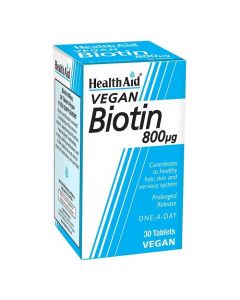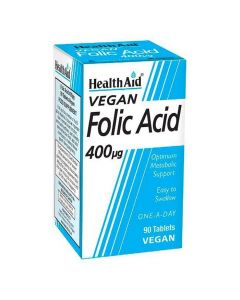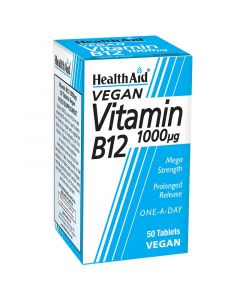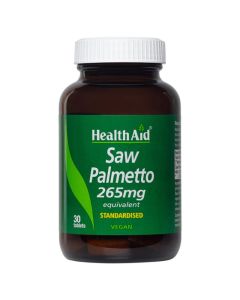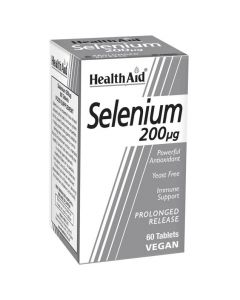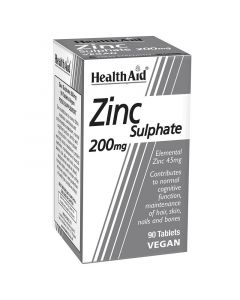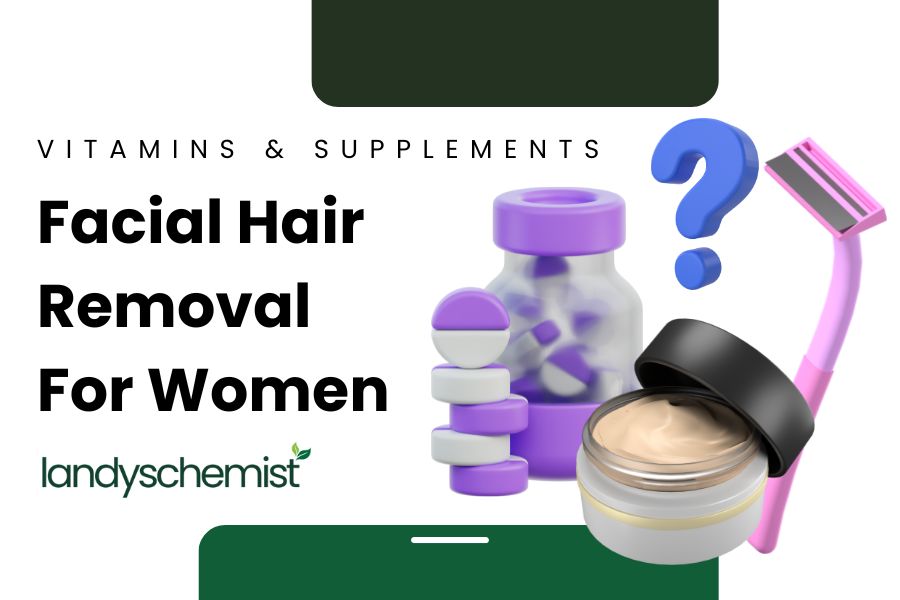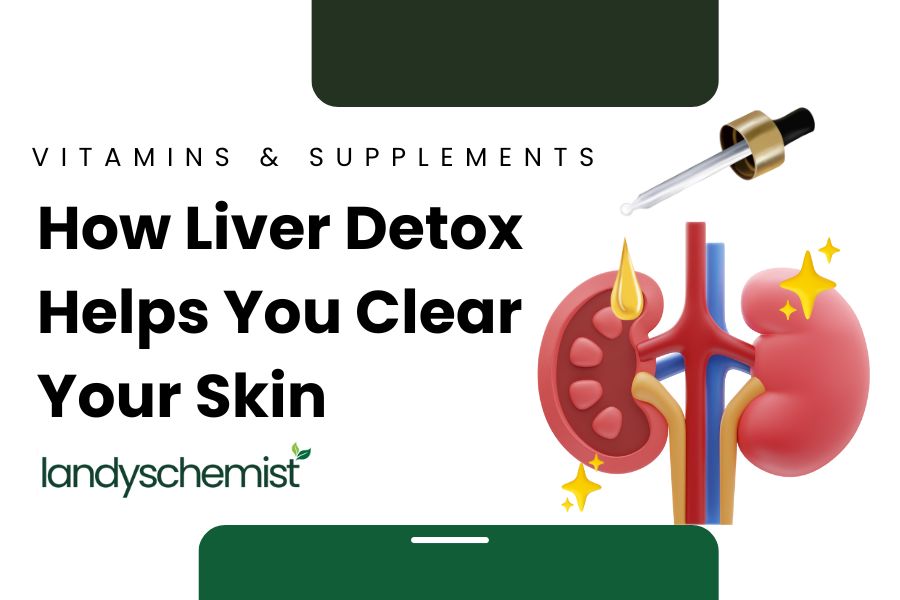
Which Vitamin Deficiency Causes Hair Loss?
Hair health is a reflection of our internal wellness, and various factors, including genetics, stress, and diet, play a role in hair growth and strength. While some amount of hair shedding is normal, noticeable thinning or bald patches may indicate an underlying health issue, including vitamin deficiencies[i]. Deficiencies in essential vitamins can contribute significantly to hair loss, thinning hair or even more severe conditions like alopecia areata[ii]. Understanding which vitamin deficiencies lead to hair loss can help in making targeted adjustments to your diet and hair care routine, potentially reversing or preventing further hair loss.
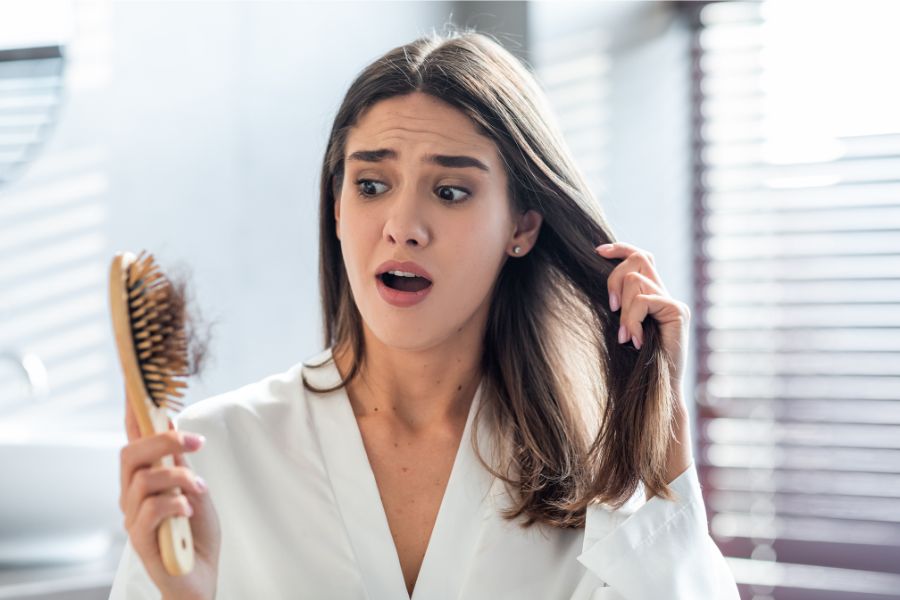
Signs of Unhealthy Hair
Unhealthy hair can appear dull, dry, brittle, and lacklustre. Common signs that may indicate poor hair health include:
- Excessive Shedding: While it’s natural to lose around 50-100 hairs daily[iii], anything above this could indicate stress on the hair or deficiencies.
- Brittleness and Breakage: Hair that breaks easily, especially at the ends or in the middle of strands, may lack essential nutrients.
- Thinning Hair: Noticeable thinning throughout the scalp can result from dietary deficiencies, stress, or hormonal imbalances.
- Slow Growth Rate: If your hair grows slower than usual, it could indicate your body lacks the nutrients necessary for hair cell production[iv].
- Scalp Issues: Dandruff, dryness, or itching could point to an unbalanced diet or lack of hydration[v].
When to Consider Supplements for Hair Loss
If you’re experiencing any of the above signs consistently, it might be worth considering supplements. However, it’s best to consult a healthcare provider who may recommend a blood test to check your levels of essential nutrients, including iron and other vitamins.
Vitamin Deficiencies That Can Cause Hair Loss
Various vitamins play a role in maintaining healthy hair. When the body lacks these nutrients, hair loss may follow. Here’s a look at the main vitamins and minerals involved in hair growth and how their deficiencies can contribute to hair loss:
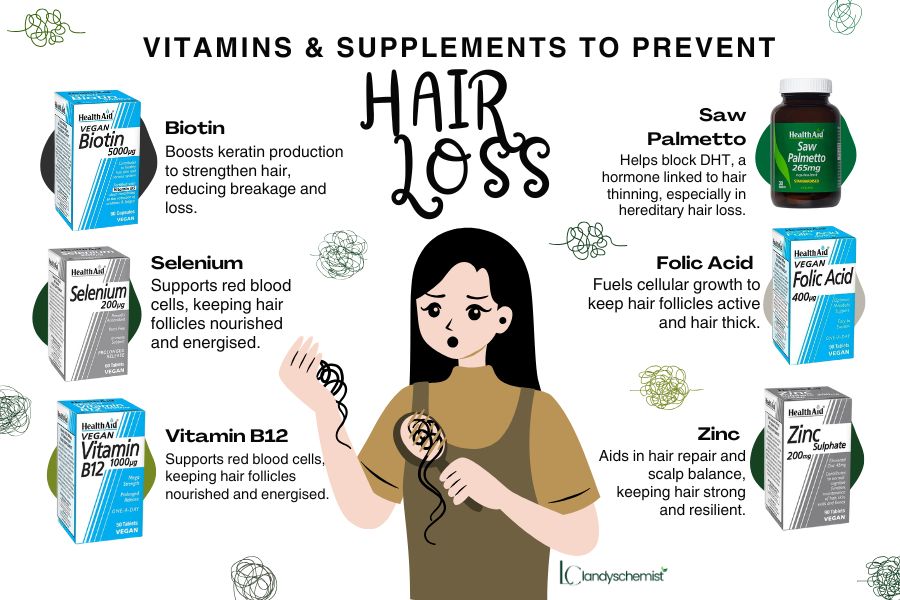
Biotin (Vitamin B7)
Biotin is essential for maintaining healthy hair, skin, and nails. It aids in the metabolism of amino acids needed to produce keratin, the structural protein that gives hair strength and elasticity. Without enough biotin, hair can become brittle and more prone to breakage, shedding, and even thinning[vi].
Folic Acid (Vitamin B9)
Folic acid, or folate, aids in cellular growth and the synthesis of DNA, which is essential for hair growth[vii]. Low levels of folic acid can slow down hair growth and contribute to greying. Pregnant women or those with poor dietary intake may experience low folate levels, which could exacerbate hair loss[viii]. For a further reading about the importance of folic acid during pregnancy, click here.
Vitamin B12
Vitamin B12 is vital for red blood cell production, which in turn supports oxygen delivery to hair follicles. Without adequate B12, the body may not efficiently produce new hair cells, resulting in thinning and slower hair growth[ix]. Vitamin B12 deficiencies are especially common in people who follow a vegan or vegetarian diet, as B12 is found primarily in animal products.
Other Supplements for Hair Loss
In addition to vitamins, certain minerals and plant-based supplements can also contribute to healthier hair[x]. Here’s how they work:
Saw Palmetto
Saw palmetto is a herbal remedy known for its benefits in treating androgenic alopecia (pattern baldness) by inhibiting dihydrotestosterone (DHT), a hormone associated with hair loss[xi]. This supplement may be beneficial for those experiencing hair thinning, especially in men with hereditary hair loss.
Selenium
Selenium plays a role in protecting hair follicles from oxidative stress, which can damage cells and hinder hair growth. It also helps balance the thyroid gland, which regulates hair loss[xii]. Selenium is found in nuts, fish, and eggs, but it’s also available in supplement form for those who may need more.
Zinc
Zinc supports protein synthesis and cell division, essential processes for hair repair and growth. Zinc deficiency can lead to hair shedding and scalp inflammation, which can further exacerbate hair loss[xiii]. Left untreated, zinc deficiency may contribute to weak, brittle hair prone to breakage, making it essential for those with thinning or shedding concerns.
Read more: Pumpkin Seed Oil for Hair
Haircare and Lifestyle Changes to Help Prevent Hair Loss
Alongside vitamins and supplements, lifestyle changes and hair care practices can help prevent hair loss. These practices include:
- Balanced Diet: Eating a variety of nutrient-rich foods, including fruits, vegetables, lean proteins, and whole grains, provides essential nutrients that support hair health.
- Hydration: Drinking enough water keeps the scalp and hair hydrated, preventing brittleness and breakage.
- Gentle Haircare: Avoid excessive heat styling and harsh chemical treatments, as these can damage the hair shaft and contribute to thinning hair[xiv].
- Stress Management: Chronic stress can trigger hair loss conditions like telogen effluvium. Incorporating stress-reducing practices like yoga, meditation, and regular exercise can help[xv].
- Proper Scalp Care: Using gentle shampoos and massaging the scalp can improve circulation and promote healthier hair follicles.
When to See a Healthcare Professional
If hair loss is persistent and doesn’t improve with lifestyle changes or dietary adjustments, it’s important to see a healthcare professional. They may conduct a blood test to check for deficiencies in iron, B vitamins, and other nutrients, as well as evaluate other potential causes, like hormonal imbalances or underlying health conditions like alopecia areata.
FAQ
How can I tell if my hair loss is due to a vitamin deficiency?
Hair loss linked to vitamin deficiency usually accompanies other symptoms, such as brittle nails or pale skin. A healthcare provider can conduct a blood test to confirm if a deficiency is contributing to hair issues.
What vitamin deficiency most commonly causes hair loss?
Biotin (Vitamin B7) deficiency is one of the most common vitamin deficiencies linked to hair loss[xvi]. Biotin plays a key role in keratin production, giving hair its strength and elasticity. Low levels can lead to brittle, thinning hair and shedding.
Will I get constipation from iron tablets?
Constipation is a common side effect of iron supplements. Staying hydrated, increasing your fibre intake, and opting for slow-release formulas may help reduce this discomfort.
Can I take hair supplements during pregnancy?
During pregnancy, certain supplements are encouraged, but it’s crucial to consult a healthcare provider before adding new supplements to your regimen. Folic acid is especially important during pregnancy to support foetal development and reduce hair thinning[xvii].
When does postpartum hair loss stop?
Postpartum hair loss typically starts around 2-4 months after childbirth and often lasts 3-6 months. By the time your baby reaches their first birthday, most women find that hair growth patterns return to normal. However, the timeline can vary based on individual health and hormone levels[xviii].
[i] https://www.nhs.uk/conditions/hair-loss/
[ii] https://www.health.harvard.edu/diseases-and-conditions/vitamins-minerals-and-hair-loss-is-there-a-connection
[iii] https://www.mayoclinic.org/diseases-conditions/hair-loss/
[iv] https://pmc.ncbi.nlm.nih.gov/articles/PMC5315033/
[v] https://my.clevelandclinic.org/health/symptoms/23326-dry-scalp
[vi] https://ods.od.nih.gov/factsheets/Biotin-HealthProfessional/
[vii] https://pmc.ncbi.nlm.nih.gov/articles/PMC6380979/
[viii] https://ods.od.nih.gov/factsheets/Folate-HealthProfessional/
[ix] https://www.ncbi.nlm.nih.gov/books/NBK441923/
[x] https://pubmed.ncbi.nlm.nih.gov/25573272/
[xi] https://pubmed.ncbi.nlm.nih.gov/33313047/
[xii] https://www.ncbi.nlm.nih.gov/pmc/articles/PMC9489890/
[xiii] https://www.ncbi.nlm.nih.gov/books/NBK493231/
[xiv] https://pmc.ncbi.nlm.nih.gov/articles/PMC3229938/
[xv] https://www.mayoclinic.org/healthy-lifestyle/stress-management/expert-answers/stress-and-hair-loss/faq-20057820
[xvi] https://pmc.ncbi.nlm.nih.gov/articles/PMC6380979/
[xvii] https://www.nhs.uk/pregnancy/keeping-well/vitamins-supplements-and-nutrition/
[xviii] https://www.aad.org/public/diseases/hair-loss/insider/new-moms

